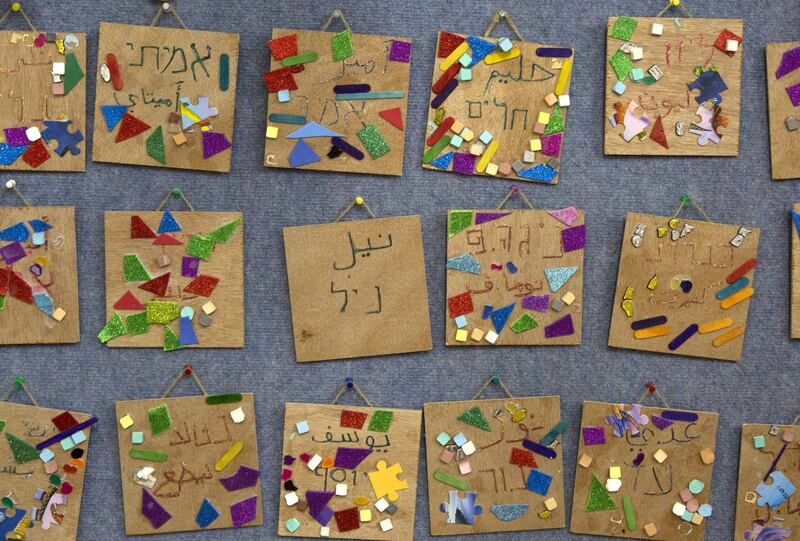Right-wing Jewish nationalists backed by Prime Minister Benjamin Netanyahu are moving closer to stripping Arabic of its longstanding status as an official language in Israel.
They are casting Arabic and those who encourage its presence as a threat to Israel's identity as a Jewish state and say it is vital to ensure complete and exclusive primacy for Hebrew.
Arab and left-wing Jewish critics say the change will further undermine the status of Israel's Arab minority, which makes up twenty per cent of the population and also send a message to the Middle East as a whole that Israel doesn't want to be part of the region. "Marginalisation of language is marginalisation of the citizens who speak that language," said former Knesset member Issam Makhoul as the Knesset marked its third annual Arabic Language Day last Tuesday in the shadow of the right-wing push. The day included presentations by Members of the Knesset, civil society groups and scholars on the status of the language.
The proposed change is part of the fervently nationalistic bill "Israel as the Nation State of the Jewish People", that passed its first reading in May. Mr Netanyahu said last week he wants it to pass second and third readings and become law by the end of the current Knesset session on July 18.
__________
Read more:
Israel bars journalist from Prince William event because he’s Muslim
Book review: Pay No Heed to the Rockets
Comment: The Israeli government wants to make the term 'Palestinian' disappear
_________
The bill specifies that Hebrew is the "state language" and that the right of self-determination in Israel is reserved exclusively for Jews. Its provisions enable residential communities to be established for Jews only, barring Arabs in a move critics liken to apartheid. Arabic was designated an official language under the British mandate, and Israel formally maintained this status. Now, however, under the bill it will no longer be official but rather is defined vaguely as having a "special status." In an apparent palliative to critics of the demotion, the bill says that nothing should be done "to harm the standing of Arabic in practice as it is on the eve of this basic law going into force."
Going after Arabic—and the nationality bill as a whole—are part of Mr Netanyahu's tactic to increase his support through anti-Arab stances and statements, according to Leslie Susser, former political editor of The Jerusalem Report magazine. "By playing the anti-Arab card, he's able to get votes for free, he's able to get support from the Israeli right, which is most of Israel," Mr Susser said.
Despite Arabic being an official language, it was never in practice equal to Hebrew, says Yoni Mendel, the author of the Creation of Israeli Arabic and a scholar at the Van Leer Institute think-tank in Jerusalem. "Many ministries do not translate their websites, you can't really correspond with authorities in Arabic, you can't get your high school matriculation statement in Arabic and there is no simultaneous translation of Knesset sessions," he said.
In the face of sluggishness to use Arabic, Arab rights organisations have petitioned the courts to enforce and promote its use, with marked success. In some cases, the very knowledge that there is legal recourse for Arabic advocates is enough to elicit translations into Arabic. Arab MK Jamal Zahalka said he recently successfully intervened with Haifa University to promote Arabic on campus. "They responded positively because they knew that if they didn't, the supreme court would force them," he said. "If now Arabic loses its official status, it will be a heavy blow because we won't be able to use the courts to force authorities and institutions to use Arabic."
That is exactly what backers of the bill want. They say limiting the use of Arabic in the public sphere is essential to protecting Israel's Jewish identity. "The approach that is at the basis of the law, which I think is justified, is that bilingualism of the state is really a significant expression of binationalism," said Adi Arbel, who represented the Institute for Zionist Strategies, a right-wing think tank, in Knesset deliberations on the drafting of the nationality bill. "There is sharp opposition against the Arab population and mainly the Arab Knesset members using the language as a way to gnaw away at the status of the state of Israel as the nation state of the Jewish people. The attempts to diminish the supremacy of the Hebrew language in the public sphere are part of the attempts of the Arabs of Israel, of the leaders of the Arabs of Israel, to come out against the idea of the state of Israel as the nation state of the Jewish people."
Mr Mendel, the Israeli scholar of Arabic, has a different perspective on Arabic's impending demotion. "This is part of the new Israeli nationalistic, to say the least, policies that do not see the Arab citizens of Israel as equals or as citizens."





